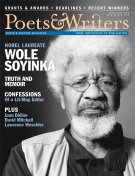As marketing director of Copper Canyon Press, the thirty-four-year-old independent publisher of poetry in Port Townsend, Washington, I am required to read a lot. While most of the titles on my reading list are poetry collections, I recently read two nonfiction texts that got me thinking about the "economics" of creative writing.
The creative writers in this country—those who have earned an MFA and those who haven't—produce untold millions of poems, stories, novels, and essays. But for whom are they writing?
So Many Books: Reading and Publishing in an Age of Abundance (Paul Dry Books, 2003), by Mexican poet and business consultant Gabriel Zaid, and Reading at Risk, the sobering report published by the National Endowment for the Arts (NEA) in 2004, articulate the challenges faced by the swelling legions of creative writers longing to find a readership. Consider the following statements extrapolated from Zaid's book and the NEA report:
1. Production of creative writing far exceeds consumer demand.
2. Accredited MFA programs in creative writing continue to proliferate, while the practice of literary reading is in steady decline.
3. Many publishers require underwriting to produce and distribute literary titles because sales do not support production costs.
4. Publishers can, with relative ease, attract a thousand manuscript submissions—plus reading fees—by sponsoring book contests.
What's wrong with this picture? If you're running an MFA program, a book contest, or a writer's workshop, or selling other goods and services that support the writer's life—absolutely nothing. If you want your book published and read by an audience other than friends and family—everything.
In a statistical mood, I once estimated how many "good poems" were being produced by recent graduates of MFA programs. Keeping all estimates conservative, I figured there had to be at least 450 poets graduating nationwide each year. If each MFA graduate wrote just one good poem a year for ten years, at the end of a decade we would have 24,750 good poems—not to mention 4,500 degree-bearing poets, each of whom was required to write a book-length manuscript in order to graduate. New poems, poets, and manuscripts are added to the inventory every year.
Admittedly, 24,750 and 4,500 are probably low numbers. After all, the Association of Writers & Writing Programs claims four hundred member colleges and universities, and most of them graduate at least one or two poets each year. The nonprofit poetry library Poets House, during its annual showcase last April, displayed over 2,100 poetry books that had been published in the previous year alone. But I use these estimates in an attempt to add perspective to the expectations not only of poets but also of writers of literary prose.
The creative writers in this country—those who have earned an MFA and those who haven't—produce untold millions of poems, stories, novels, and essays. But for whom are they writing? Where is the readership to support this prodigious output? Certainly, bookstores and libraries prove that there are still readers out there. Yet Reading at Risk sounds the alarm that the practice of literary reading in America is in serious decline.
How can it be that MFA programs in creative writing flourish in a country where literary reading does not? I recall the writer who told me, without irony, that he doesn't read because he doesn't want to be influenced. And the eight-year-old who, after I suggested we read some poems together, replied, "I like writing poems better than reading them."
MFA programs have clearly demonstrated that they can attract writers to teach and students to pay tuition. Many agree that the education is fabulous, with support and attention lavished on the individual's creative process, and, with hard work, the completion of a degree-worthy manuscript come graduation. Life is good until the new graduate wants to see that manuscript become a published book, and the reality of a tiny readership becomes real-world frustration. And where does she turn? Often, she enters a book contest.
Along with MFA programs, book contests that charge entry fees are on the rise. And it makes sense: The publication of debut poetry books is viable if the risk is offset by monies provided by hundreds of writers willing to pay for someone to read and consider their book for publication. If a more active, supportive readership existed, however, there would be far fewer contests. Publishers would be more financially motivated to publish and promote the work without them. Administering contests is not what most publishers long to be doing.
In the fifteen years I've worked in literary publishing, over ten thousand manuscripts—checks attached—were submitted to contests sponsored by the publishers I worked for. From those manuscripts, fifteen emerged as published books—good books all, with each receiving review attention from local and national media, and several going on to earn accolades. In each instance, the net sales ranged from four hundred to twenty-five hundred copies. Calculating production costs, distribution fees, and so on, selling twenty-five hundred copies of a fifteen-dollar paperback might allow the publisher to break even; selling five thousand copies would yield a modest profit, but that sales mark is seldom reached.
One solution is simple enough: If you write, read. A lot. If you want a book published and sold in the marketplace, then buy and read and recommend enough books to nourish the system you want to enter. Advocate on behalf of literature. And, most quixotic of all, every MFA program should require all potential graduates to convert at least one eight-year-old into a passionate reader.
Otherwise, we're faced with a bloated "writership" vying for the attention of an anemic readership. Of course, the readers left could start charging for their time. Envision the classified: "Reading group ready to devour your novel. $250. Rants and raves extra."
Joseph Bednarik is the marketing director of Copper Canyon Press.








